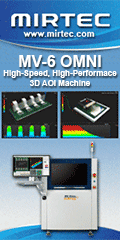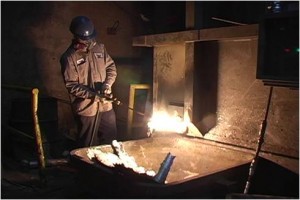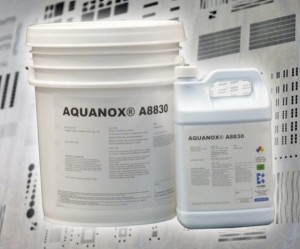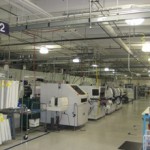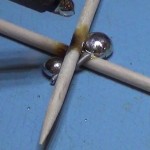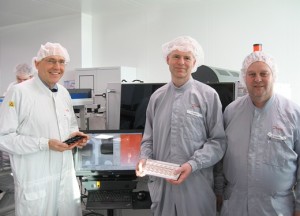By Ed Nauss, Global Account Manager, SMT Business Group, Yamaha Motor IM
Since the company’s founding in 1973, Technical Services Inc., the Pacific Northwest’s first EMS, has built a lot of product for many different industries. The company has gone from hand assembly to high-speed production manufacturing and assembly using today’s most challenging components. With multiple SMT manufacturing lines, TSI has found that a legacy EMS company can continue to benefit by investing in capacity and advanced new technology, pushing the capability envelope, and thinking outside the box. The benefits have included greater capacity, expansion into offshore markets that were once out of reach, and expansion of the customer base overall by being able to build a wider range of products for more customers in the same space, and to build them faster. The key to this success has been advanced production technology from YAMAHA and unflagging service and support from Trans-Tec Worldwide, a well-established global leader in the sales, distribution and service of SMT equipment for a complete range of products and client industries.
A Tradition of Growth and Quality
TSI is the oldest EMS in the Northwestern United States, says TSI’s Abdul Sharif, VP / Chief Operating Officer. TSI was founded in 1973 by two business partners, Gary McGregor and Dee Boothe; Gary founded the company and Dee joined a year and a half later. TSI began making products for the telecommunications and consumer electronics industries, products such as answering machines and radar detectors. “Everything in the beginning was hand-soldered until Dee joined the company and we purchased our first wave soldering machine,” Abdul recalls. “When Gary passed away in 1996, Dee took full ownership of the company.”

(L to R) Karl Wasickanin, SMT Manager, TSI; Chris Edenburn, Operations Manager; Abdul Sharif, VP / Chief Operating Officer; and Rick McCollough, Trans-Tec.
TSI saw steady growth through the 1980s with many big-name companies as customers. “During the 1990s,” he adds, “we had a contract to build the phones that were found in the backs of the seats on all major airlines. In the early 2000’s, TSI began assembling electric toothbrushes, and ultimately we built more than 25 million.”
Today, TSI sits on a 20-acre property and in 1995 the company expanded and put up a second building, adding an additional 12,500 sq. /ft. In 2011, Dee Boothe sold the company, and TSI became an employee-owned company, or ESOP, an Employee Stock Ownership Plan company.
“We’re now in our sixth year as an ESOP company, whereby employees who were aboard during 2011 are now fully vested into the plan,” Abdul says. “We recently had a lady retire after 42 years at TSI; she had joined the company the same day Dee Boothe started in 1974. Under the new arrangement, we reinvest profits back into the company, and give 20% of the profits back to the employees in profit-sharing. Since we are not beholden to any investors, we don’t have the pressure of pushing for higher and higher margins. A major result of ESOP, for us, is high employee retention; in fact, we are the biggest employer on the island. But the most significant impact of ESOP has become the high quality of work performed by our employees.”
Chris Edenburn, Operations Manager, says that “The people working here are a major factor in our success. For example, we have an on-site IPC-certified trainer, and all employees undergo comprehensive training before stepping onto the manufacturing floor. This training has shown itself to be instrumental to our success, contributing to higher product quality and overall efficiency.”
“Since 2011, TSI has made more than $13 million in capital equipment investments. All four Pick-and-Place assembly lines have been upgraded. New X-Ray, Test equipment and conformal coating systems have been added. All of TSI’s production equipment, across the board, has been either updated or improved,” Chris adds.
Abdul continues, “Today, we build to satisfy the power supply requirements for every major airline’s in-flight entertainment systems, as well as Wi-Fi remote controls, parking gate readers, advanced dental chairs, irrigation systems for farming, medical devices, consumer audio, and even hair removal and replacement machines. We satisfy a wide range of industrial and consumer product requirements. Even with all these products, we deliver a quality yield at 99.98% out the door; this is key to our success. TSI has been extremely successful, with stock growth at 50-100% annually for the past six years. Going forward, we plan to expand with a new 70,000 sq./ft. facility.”
First Experience in SMT, and Yamaha
Karl Wasickanin, SMT Manager, recalls that “Our first introduction to SMT was when we purchased a Yamaha Gem Series in 1998. We had good experiences with the GEM series machines until the machine’s service provider company gradually diminished the level of service quality that they were delivering. It was no longer adequate and we became very unhappy with the situation. Thus, when we began once again looking for equipment in 2011, we were fortunate to connect again with Yamaha and were introduced to Trans-Tec Worldwide. Once they came onto the scene, Trans-Tec really stepped up to the plate in servicing the GEM equipment. I had established a great working relationship with the service engineers at Trans-Tec. This relationship made it an easy decision to transition to Yamaha for the next purchase of equipment.”
“We walked the APEX show that year and came away with the reinforced decision to stick with Yamaha; there was no hesitation,” Karl relates. “This partnership over the years with Yamaha and Trans-Tec has kept Yamaha as our only choice for PCB assembly equipment. Yamaha and Trans-Tec have been supporting us throughout the entire process. The high level of service was a huge plus for TSI along with the reliability of the Yamaha machines. The equipment is built so well and robust that it quite literally runs forever,” he adds.
Karl continues, “Trans-Tec introduced us to one of their major customers. We spoke to many people, all of whom highly recommended the Yamaha equipment. We also had the opportunity to speak at length with one of the Trans-Tec service professionals, and that was an important experience. When we installed and commissioned our first line, I was most impressed that the line was up and running product in only two days. From our perspective, it was certainly different equipment, but it was so similar to the GEM Series that we saw no down time, and the operators had no problems learning and operating the new machines. Additionally, the Yamaha machines are very flexible. I can run product on any line and get the same results.”
“We’d had experiences with other vendors where it would be weeks before the process was debugged. But now, even with all four of our lines, we were up and running in a couple of days, in large part due to the reliability of the Yamaha machines, something that we have experienced since day one. Recently, we have captured business that previously was offshore; the Yamaha machines have made us more competitive in that market.”
Increased Capacity Means More Customers
With the Yamaha machines, TSI can place more than a million components per hour, thereby increasing capacity in the SMT area, Karl says. “This means that we can accept more customers who are SMT component-focused with the additional capacity that the Yamaha machines provide. Improved throughput in the Yamaha lines has helped us expand our business to encompass more challenging technology with 0201, 01005, finer pitch, and micro BGAs. The new Yamaha machines give us the that versatility.”
Abdul adds, “One important thing that sets us apart from the competition is the fact that we don’t treat NPI builds differently; we treat them like production. This allows us to optimize our manufacturing process and eliminate any glitches when these products make the transition to production. We also perform full AOI inspection even if it’s on a small run; everything is inspected. For this reason, AOI is very important to us at TSI. If we have a secondary through-hole process, we run the boards a second time through AOI to make sure that if any defects have been created during the process, we catch them at that point and correct the process. As a result, we are now seriously looking at the Yamaha YSiV AOI system to improve inspection in this area.”
Consistent Solder Paste Print Quality
“We received the first YSP printer here in the U.S.,” Karl says. “Once we saw the quality of prints this machine was producing, we made the decision to make Yamaha our only supplier for printers going forward from that point. We had previously used competitive machines but the reliability of the YSP printer and the overall print quality that it produced were so much better that it was an easy decision. Once we began using the Yamaha printers, we felt that we did not have to inspect the solder; the print quality was that consistent. The Yamaha YSP is by far the best printing machine we have seen to date.”
“Being the oldest EMS provider in the Northwest region, we are well-connected to other companies in this area,” Abdul points out. “We have heard the negative experiences others have had with other vendors. This made the Yamaha decision the right one for TSI. And although we advised another company to buy Yamaha, they decided to go with another vendor. It took them 6 months to be up and running whereas we have averaged 48 hours.”
Improved Machine Features a Plus
Improvements in the Yamaha equipment and well-thought-out features provide significant advantages to TSI, Karl relates. “We’ve seen significant improvements in the software and P-Tools, and these are ongoing, getting better all the time. The operators find the interface easy to use, and all of the software is similar from the printer to the mounter to the AOI system; thus it is very easy to transition from one machine to another.” Also, the extra feeder space on the YSM20 machines is a huge advantage, he says, and “The fact that we can use our older mechanical feeders on all machines including the YSM20 is a big plus.”
Trans-Tec’s Support Critical to Success
Throughout TSI’s experience with Yamaha, the support provided by Trans-Tec has been critical to keeping the machines up and running properly with minimal down time. “The one-to-one contact whereby our people can contact Trans-Tec directly with no intervention on my part frees up my time,” Abdul says. “We have been provided with multiple contacts within Trans-Tec, so there’s always someone there to take the call. Trans-Tec was very helpful with financing; after all, four lines in three years is a big investment. They have been very accommodating to us and have been a great company to do business with. The relationship is solid and we know Trans-Tec and Yamaha are partners in our success.”
Abdul recalls, “When we first received our new machines, Karl, who was out of the office, was the only one trained on programming at the time. Wouldn’t you know, we landed a hot project that needed to be turned around that day. We contacted Trans-Tec and one of their engineers had us up and running in 45 minutes.”
Emerging Industry Issues
“Component lead times are going way out even for your basic resistors and capacitors,” Chris notes. “Some parts are going into allocation where the distributor decides who gets the parts. Also, what’s going to happen with NAFTA is a concern for many customers.”
“Earlier this year, we saw a surge in business from five of our top customers as they pulled business back from over the border. This has been a contributing factor in the acquisition of our newest lines. We would not have been able to handle this influx of new business without the new Yamaha lines.”
‘Re-shoring’ Challenges
“In general, we are seeing a trend where customers are increasing their percentage of product being built in the North American manufacturing market that is being pulled back from overseas,” Abdul observes. “Disruptions to shipping like we experienced recently with the dock stoppage is a good example of what might occur. Therefore, companies like TSI are now more competitive and as such have become more attractive to our customers. Many of our competitors are facing capacity issues, but not here at TSI. With the higher throughput that the Yamaha machines give us, we’re seeing reduced labor costs and greater competitiveness against overseas EMS companies as well. Our equipment choices, in partnership with Yamaha and Trans-Tec, have helped us stay competitive and handle the ebb and flow of business as we move forward.”
Technical Services Inc., 970 NE 21st Court, Oak Harbor, WA 98277,Tel: (360)675-1322 Web site: www.tsiems.com.
Photo Caption: (L to R) Karl Wasickanin, SMT Manager, TSI; Chris Edenburn, Operations Manager; Abdul Sharif, VP / Chief Operating Officer; and Rick McCollough, Trans-Tec.
Views
Skyscraper 1
